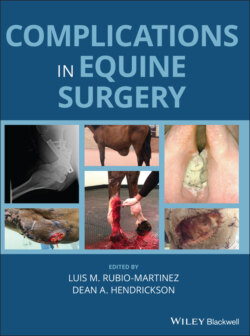Читать книгу Complications in Equine Surgery - Группа авторов - Страница 68
Complications Associated with the Type of Crystalloid Fluid Infused
ОглавлениеFluid therapy can lead to acid–base and electrolyte imbalances when given to a healthy animal, but also overcorrections of pre‐existing abnormalities can lead to severe side effects if not performed correctly. Sodium and potassium mainly, but also chloride, calcium, magnesium and phosphor homeostasis, are important.
Many different crystalloid fluids are available commercially, containing varying concentrations of different electrolytes and base equivalents. Few formulations are currently available in 3–5 L bags, while 1 L bags usually are available but are often cost‐prohibitive and cumbersome to be administered to a normal sized horse. Depending on the country and legislation, these fluids differ slightly in their composition. Every clinic/hospital/practitioner should attempt to get an overview of formulations available in his/her country for administration to horses and should know content and concentrations including osmolality of the fluids.
Replacement fluid therapy should be considered separately from maintenance fluid therapy, especially the type of fluid chosen. In general, replacement fluids (e.g. Lactated Ringer’s, isotonic saline, Normosol‐RTM, Plasmalyte ATM) are very close to serum concentrations for sodium, chloride and potassium, whereas maintenance fluids contain much lower amounts of sodium and chloride and higher amounts of potassium as well as other electrolytes and sometimes glucose (e.g. Normosol MTM).
